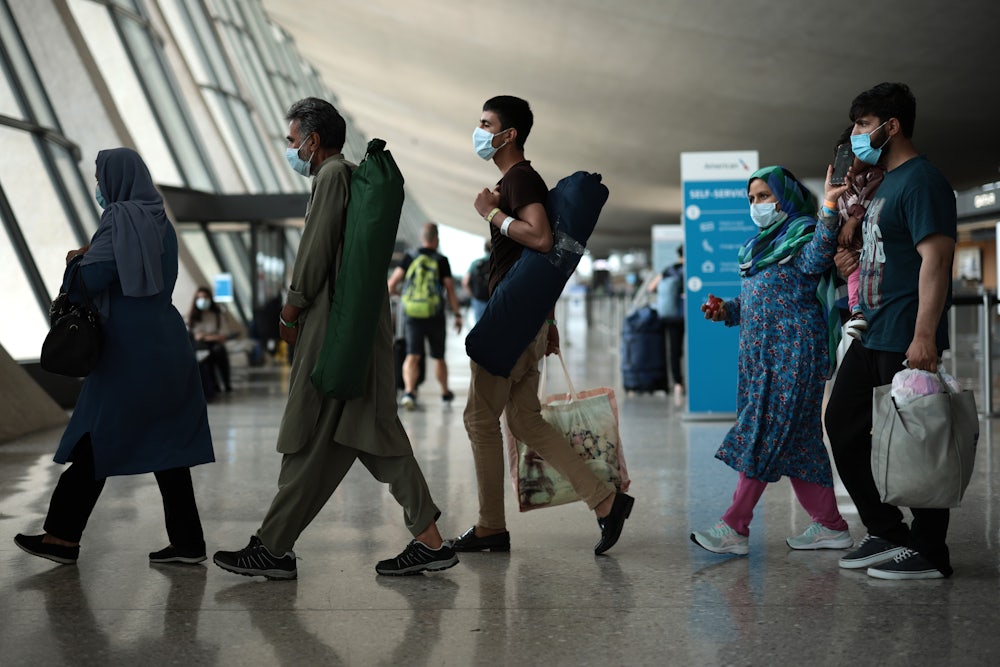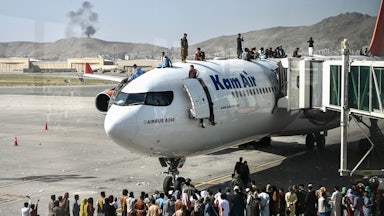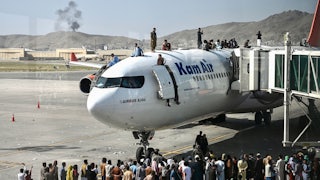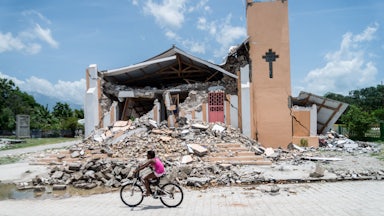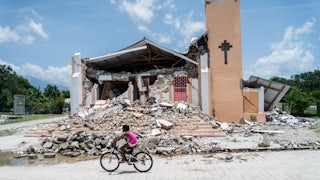Thousands of Afghan refugees are touching down in the United States, ready to restart lives shattered by U.S. failure. The government has already failed to enact the sort of broad evacuation and resettlement program that it did after the Vietnam War, but as of September 1, the State Department says over 23,000 Afghans had been brought to the U.S., both interpreters and support staff under the Special Immigrant Visa program and others in danger of harm and persecution from the Taliban. Safe arrival in the U.S. is unquestionably the first priority for the evacuees, but the hurdles do not end there.
The U.S. refugee resettlement system, built out of a patchwork of government agencies, large resettlement organizations, and local nonprofits and volunteers, suffered catastrophic losses during the Trump administration, which slashed the number of refugees admitted to record lows. Many organizations helping with resettlement closed their doors. Then the pandemic hit, slowing resettlements further and throwing the fortunes of recent arrivals into disarray and uncertainty.
Adding thousands of additional refugees from Afghanistan could overwhelm the already stressed resettlement infrastructure, making it hard to provide individualized services. A certain level of strain is inevitable, but support from both volunteers and government officials could make an enormous difference in the amount of friction and strife that the refugees experience. Mainly, the system needs money, warm bodies—both specific types of professionals and general volunteers to do things like drive people around—and a willingness by local, state, and federal officials to actively remove bureaucratic roadblocks and use the extent of their discretion to reduce administrative barriers.
Refugee arrivals need help with a wide variety of quotidian things: They need to get social security numbers, sign up for Medicare and food assistance, enroll their kids in school, obtain driver’s licenses and a place to live. These building blocks of life each require time, energy, and—perhaps most importantly—some level of institutional know-how to achieve, making newcomers to an extent dependent on navigational support from locals.
“We’re particularly focused on how we address affordable housing,” said Krish O’Mara Vignarajah, president and CEO of Lutheran Immigration and Refugee Service, or LIRS, one of the nine large voluntary agencies, as they are known, that coordinate refugee resettlements in the U.S. “We need to make connections with landlords who will rent to these families at affordable rates, amid a general housing crisis.”
Hamed, a former cultural adviser and interpreter for U.S. officials in Afghanistan, who asked to be identified by a pseudonym given that he still has family at risk there, arrived in the U.S. with a Special Immigrant Visa on July 20, just long enough ago to have gotten his bearings. He said that other Afghans he’s in touch with have resorted to staying with friends and scrambling to find a place to live because they hadn’t had time to coordinate their arrivals with resettlement groups in the chaos of the late evacuation. Lutheran Social Services of the National Capital Area, a local nonprofit partner of LIRS, rented Hamed and his wife an apartment and is providing professional training to help him find a job.
“I don’t have my food stamps yet, or Medicaid,” Hamed said, despite having applied almost as soon as he arrived. He theorized that this was due to the fact that “there are lots of Afghans coming and, in the meantime, there are restrictions in terms of the Covid … that cause some delays in processing.”
Among those who arrived feeling somewhat unmoored and unsupported was Ada Alkozay, who worked with the U.S. military for four years and touched down in Virginia on August 6 with a newly issued Special Immigrant Visa in hand. She said she had communicated with LSSNCA prior to her departure about housing and logistical support but, on the eve of her flight, was told that a final approval for assistance in her case had not been granted. “I was worried because I just don’t want to be on the streets. So I, two or three times, asked them, ‘Are you able to bring me to a hotel?’” she said.
Instead, she ended up staying with a friend’s mother in Virginia, where she says she spent two weeks asking LSSNCA for an update, only to be told that the whole system was backed up by the sheer number of incoming Afghan refugees. Eventually, she gave up and moved to New York City, where another friend was able to get her set up with an apartment. She’s now working with the International Rescue Committee but still, almost a month after she landed, she hasn’t managed to get health insurance or other social assistance.
Alerted to Alkozay’s account, LSSNCA CEO Kristyn Peck wrote that a review of Alkozay’s case notes and other documents confirmed she had not immediately received full assistance from the agency. Still, Peck said Alkozay was offered a hotel but preferred to stay with her friend’s mother and was given some emergency funds for food and pocket money. It’s possible that in the agitation of her arrival, Alkozay may have believed that the lack of full approval meant she wouldn’t be given a place to stay.
These types of miscommunications and delays are an inherent risk when dealing with large numbers of people. “We were told the last week of July that we would begin receiving cases of Afghan allies that were being evacuated, starting July 31,” Peck said in a phone call. “In the four years of the Trump administration, given the very restrictionist policies of that administration, we served approximately 500 refugees a year. Ninety-four to 98 percent of those were Afghan SIV holders.” In the month of August alone, she said, “we have served 500 individuals.”
State and local governments have made adjustments to their resettlement policies due to Covid-19. In Monroe County, New York, the health department is coordinating with Keeping Our Promise, an organization that works to resettle SIV recipients in the Rochester area, to conduct Covid-19 testing and vaccination at refugees’ homes. It might seem like a minor concession, but it cuts down on a number of otherwise troublesome logistical steps. “Volunteers don’t want to take people in their cars. A lot of the volunteers are older, and they don’t want to risk getting Covid,” said Theresa Schwartz, who acts as the organization’s Covid liaison and coordinates some volunteer assistance to refugees. “It’s also logistically difficult because some of the families have three or four kids, and you’d need a whole caravan of volunteers to take them to a testing site, because you can only fit so many car seats in a typical vehicle.” With a little coordination, local officials managed to clear a whole series of logistical snags.
There are a thousand such small obstacles that can trip up new arrivals. Local, state, and federal authorities can help by clearing some of the red tape, and then volunteers help hack through the red tape that remains. This can start as early as the application phase: The Biden administration only recently began allowing would-be evacuees to apply for humanitarian parole instead of the much more onerous refugee processes, though it continues to charge an absurd $575 fee per application, for people who often fled home with nothing but what they could carry.
Parolees, however, are not eligible for the same benefits as SIV refugees under the Department of Health and Human Services’ Office of Refugee Resettlement, Peck noted. For example, people on humanitarian parole are required to secure vaccinations within a week of arrival: “If they arrived directly here as SIV holders, that would be covered through ORR, but because they arrived with parole status, we’re paying for that out of pocket, like $300 per person,” said Peck. The administration could move to make the full slate of ORR benefits available to Afghan parolees.
While earlier waves of Afghans arrived in the U.S. with their SIV status approved and in hand, newcomers will increasingly be at different stages of the process or not have any ongoing permanent immigration petitions at all. They are going to need lawyers. Lots of them. “As more flights arrive—knock on wood—we expect less and less of those folks to be arriving with visas in hand,” said Tim Young, LIRS’s press secretary.
“We need more pro bono lawyers who can help navigate a complex legal system with people for some of whom English is a second language,” said O’Mara Vignarajah. “The legal needs of new arrivals are going to really run the range. In addition, we’ll need to think through workarounds because some will have fled with just the clothes on their back, others will have burned the paperwork that could be a death warrant if the Taliban captured them. So this is a system that needs to be nimble and take into account the result of military withdrawal.”
Various other types of professionals will also be in demand. Many are arriving both without insurance and “with unmet health needs,” said Schwartz. “Some of them need urgent care or even to go to the emergency room. Volunteers need to be arranged for that as well,” said Schwartz. (Peck cautioned that the media coverage is causing LSSNCA to get more volunteer requests than it can immediately process and vet, and people should be patient and prepared to be called on in the long term.)
Beyond physical health, mental health is an urgent priority. Many, if not most, are arriving with post-traumatic stress disorder or extreme anxiety about their family members and friends left behind. Hamed asked me if I knew the protocols for getting his remaining family out of Kabul, though at that point the only feasible option was to try to get to the airport. Days later, a suicide bomb attack killed at least 90 Afghans and 13 U.S. service members at airport’s entrance.
“Anxiety is rampant. I wouldn’t say depression yet, because they haven’t given up hope. They’re not hopeless,” said Schwartz, though that might be changing as the situation continues to deteriorate. Mental health interventions are going to have to be in part either supplied by volunteer providers or funded through volunteer contributions.
Schwartz has spoken to some Afghans who have even broached the idea of returning, driven to desperation by their fears for their families. “Especially the young guys who come here by themselves, and they’ve left behind mothers, fathers, sisters, brothers. They’ve been fighting with the army all this time, and they feel so helpless that they can’t go protect their own family, so some of them actually want to go back. We try to talk them out of it, obviously, because we’ll probably never see them again,” she said.
Alkozay reflected a similar sentiment: “America was like my dream. I actually came here because of my rights. In Afghanistan, women cannot do anything,” she said. Yet now that she’s here, “I cannot think about my future. I’m thinking about my family.”
